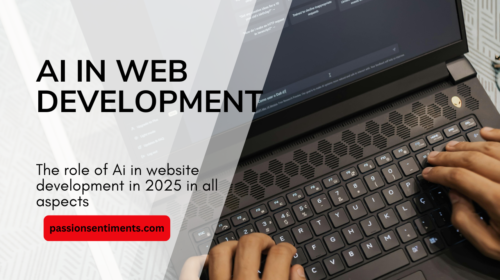Artificial Intelligence (AI) has revolutionized many industries, and website development is no exception. The Role of AI in Web Development is to enhance web design, user experience, and functionality, enabling businesses and individuals to create more efficient, engaging, and high-performing websites. From AI-driven design tools to automated coding solutions, the role of AI in website development is expanding rapidly. This article explores how AI is shaping the future of web development and what to expect in 2025.
1. AI-Powered Website Builders
One of the most significant advancements in website development is the rise of AI-powered website builders like Wix ADI, Bookmark AiDA, and Hostinger Website Builder. These tools use machine learning algorithms to generate fully functional websites based on user input.
Benefits of AI Website Builders:
- Speed and Efficiency: AI can create a website within minutes, reducing the time needed for manual design and development.
- Customization: AI algorithms analyze user preferences and generate personalized designs.
- Ease of Use: No coding knowledge is required, making website creation accessible to everyone.
In 2025, these builders have evolved to offer even more sophisticated customization options, adaptive layouts, and predictive design recommendations based on user behavior and industry trends.
2. Automated Web Design and User Experience Enhancement
AI is transforming web design by automating various aspects of the creative process. AI-powered design tools like Adobe Sensei and Canva’s AI features enable designers to generate aesthetically pleasing layouts, select color schemes, and create responsive designs effortlessly.this step play important role of ai in web development
How AI Enhances UX:
- Personalization: AI-driven websites adapt content, layout, and features to individual users.
- A/B Testing Automation: AI can automatically test different website elements to determine which designs work best.
- Predictive Analytics: AI anticipates user behavior and makes real-time adjustments to improve engagement and retention.
3. AI in Content Generation and SEO Optimization
Content is a crucial part of any website, and AI tools are making content creation more efficient. AI-driven platforms like GPT-4, Jasper, and Copy.ai can generate high-quality text, product descriptions, and blog posts based on user prompts.ai in web development
AI’s Role in SEO:
- Automated Keyword Research: AI tools analyze search trends and suggest relevant keywords.
- Content Optimization: AI enhances readability, ensures keyword placement, and improves SEO rankings.
- Voice Search Optimization: With the rise of voice search, AI helps websites adapt to conversational search queries.
In 2025, AI-powered SEO tools are even more advanced, offering real-time optimization suggestions and detecting algorithm changes to keep content ranking high in search results.
4. AI-Driven Chatbots and Customer Support
AI chatbots have become essential for enhancing customer experience. They provide instant responses, handle inquiries, and even assist with transactions. Tools like ChatGPT, Drift, and Tidio are leading the way in AI-driven customer support.
Advantages of AI Chatbots:
- 24/7 Availability: Chatbots operate round the clock, offering instant support.
- Personalized Interactions: AI remembers user preferences and tailors responses accordingly.
- Cost-Effective: Reduces the need for human customer service agents.
In 2025, AI chatbots have evolved to be even more intuitive, capable of handling complex queries, and providing a human-like conversational experience.
5. AI for Website Security and Fraud Prevention
Cybersecurity is a major concern for website owners, and AI is playing a crucial role in enhancing security measures. AI-driven security tools can detect and mitigate cyber threats in real-time.
AI Security Features:
- Anomaly Detection: Identifies unusual website behavior to prevent cyberattacks.
- Automated Threat Response: AI responds to security threats faster than traditional methods.
- Fraud Prevention: AI helps e-commerce sites detect fraudulent transactions and prevent chargebacks.
As cyber threats continue to evolve, AI security solutions in 2025 are more advanced, incorporating predictive analytics to identify potential risks before they occur.
6. AI-Driven E-commerce Enhancements
E-commerce websites benefit immensely from AI technology, improving the shopping experience for customers. AI-driven recommendations, automated pricing strategies, and virtual shopping assistants have become standard in 2025.
AI’s Role in E-commerce:
- Personalized Shopping Experiences: AI analyzes user data to provide tailored product recommendations.
- Dynamic Pricing Strategies: AI adjusts prices in real-time based on demand, competitor pricing, and customer behavior.
- Visual Search: Users can upload images to find similar products using AI-powered image recognition.
7. AI in Web Development and Coding Assistance
AI is not just for non-coders; it is also transforming the work of developers. AI-powered coding assistants like GitHub Copilot, OpenAI Codex, and Tabnine help programmers write, debug, and optimize code efficiently.
Benefits for Developers:
- Faster Coding: AI suggests and completes lines of code automatically.
- Bug Detection: AI identifies and fixes errors in real-time.
- Code Optimization: AI analyzes performance and suggests improvements for efficiency.
In 2025, AI-driven development tools are more refined, allowing developers to build complex applications faster and with fewer errors.
8. AI-Powered Voice and Visual Search Capabilities
With the rise of voice assistants like Alexa, Google Assistant, and Siri, AI has made voice search a dominant trend in website development. Websites optimized for voice search rank higher in search results and provide a more user-friendly experience.
Visual Search Advancements:
- AI-powered Image Recognition: Users can search for products or information using images.
- AR Integration: Augmented Reality (AR) powered by AI enhances user interaction with digital content.
By 2025, AI-powered voice and visual search technologies are standard features in modern website development.
9. AI in Web Accessibility
Ensuring web accessibility for all users, including those with disabilities, is a growing priority. AI-driven tools help developers create websites that comply with accessibility standards.
AI Accessibility Features:
- Automatic Alt Text Generation: AI generates accurate descriptions for images.
- Speech-to-Text Capabilities: Enables voice navigation for users with disabilities.
- Adaptive User Interfaces: AI adjusts UI elements based on user needs.
By 2025, AI-driven accessibility solutions make the web more inclusive and user-friendly for all individuals.
Conclusion: The Future of AI in Website Development
AI is revolutionizing website development in ways never seen before. From automated design and content generation to enhanced security and accessibility, AI is making websites more intelligent, efficient, and user-centric. As AI continues to evolve, businesses and developers must stay ahead of trends and leverage AI-powered tools to create the best digital experiences.
By embracing AI, website developers in 2025 can build smarter, faster, and more secure websites that cater to the ever-changing demands of the digital world.
related topic



